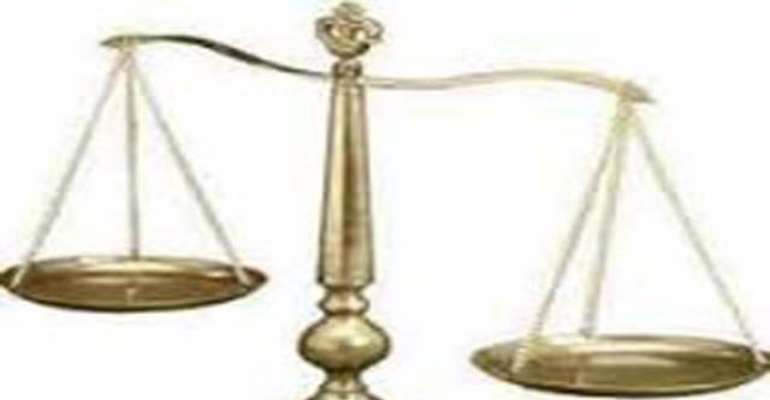Judiciary's lingering problems – The Guardian

The focus the other day on the various ills affecting and even undermining the judiciary is certainly well deserved. As an arm of government, the judiciary is perhaps the most important, being the famed last hope of the ordinary man. The average citizen, dissatisfied with the actions of both the Executive and the Legislature, as well as with other citizens and institutions, has nowhere else to go and seek redress, except the judiciary. Therefore, observations and suggestions coming from the top functionaries of the institution cannot but be desirable.
In particular, the issues affecting the judiciary, pointed out by the former Chief Justice of Nigeria, Justice Mariam Aloma Mukhtar, are pointers to the rot, that has persisted over the years; and which requires urgent cleaning, in the judicial system. Like other spheres of national life, the temple of justice is tainted. The 2014 Conference of All Nigeria Judges of the Lower Courts organized by the Nigeria Judicial Institute (NJI) provided a useful platform for Justice Mariam Aloma Mukhtar and new CJN, Justice Mahmud Mohammed, to beam the searchlight on the sector once more.
Justice Mukhtar pointed to the spiraling impunity of public officers to judicial pronouncements, poor welfare provisioning for judges and the paucity of facilities in the judiciary. In particular, the then Chief Justice took a swipe at the governors whom she said were responsible for the poor conditions under which judicial officers worked. She cited the non-compliance with the ruling of a federal high court on the enforcement of the autonomy of the judiciary. The former Chief Justice had noted that the impunity of public officers went beyond the question of indifference to court rulings, to levels in which courts were shut as a result of political squabbles between politicians. Bemoaning the poor welfare condition, she had cited instances in which judicial sessions had to hold in classrooms, town halls and rented apartments. On his part, the new Chief Justice, Mohammed, indicted the prosecutors as being responsible for the delay of cases burdening the judicial review process and that special courts would not be the solution; rather it should be sought in the personnel managing the judicial process.
It is instructive that the late Justice Kayode Esho, JSC, once decried corruption in the judiciary and recommended a purge. That problem has not been resolved even now, despite spirited efforts of Justice Mukhtar. Although her latest concern was on the deliberate or negligent undermining of the judiciary by state governments, the judiciary has not witnessed a turn-around and is still burdened by the corrupt influence of politicians as well as its own spawned bureaucratic ills. The task really is to surmount the identified problems. Justice Mukhtar was forthcoming in this regard. She counseled on the need to be above board and cautioned against the exploitation of the contradictions in the judiciary as basis for perpetrating corrupt practices. In particular, she told the magistrates, whom she described as grassroots judges, to be mindful of their actions and abide by the judicial code of conduct because their acts of omission and commission could have a domino effect on the society. In her words, 'All your actions and utterances must be graceful and full of integrity. Your comportment must be judicial and impeccable. As judges closest to the people, and as the first gate to this heaven-like institution, you must bear in mind that people are watching you.' She also advocated impartiality as key to judicial legitimacy and advised judges to avoid religious bias and disrespect for the tradition of the communities unless in cases where such customary traditions are at variance with the basic laws of the country.
The spotlighting of the rot in the judiciary by the outgoing Chief Justice is apposite. Nonetheless, she is leaving behind a deplorable situation in the Rivers State Judiciary, a part of the Nigerian judiciary, which she ought to have resolved before bowing out as head of the judiciary. The result is that the entire arm of government in the state is paralysed. The appointment of a chief judge for the state remains unresolved. The Nigeria Judicial Council (NJC), headed by the CJN, is supposed to advise and make suggestions to the state governor in respect of appointing a Chief Judge. Instead, it sought to turn advice into a mandate. Sadly, her robust and ennobling achievements in office will now be tempered by her inability to resolve the Rivers State judicial crisis. The state still has no Chief Judge today. Clearly, the NJC's role in prolonging the impasse has left much to be desired,
More important, it is to be reiterated that the judiciary is beset with numerous problems beyond the corruption issue. Additional thereto is the delay in prosecution of cases. Granted that the cause of delay is often traceable to the parties in court, or to the office of the public prosecution, the judiciary nonetheless needs reforms in ways that can breathe fresh air into the system and re-invigorate it by ensuring that the welfare of judicial officials is attended to. There is need also to ensure that judicial infrastructure across the country is improved, to aid the prompt dispensation of justice, while simultaneously curbing the impunity of public office holders who have over time denigrated the temple of justice. This task now falls squarely on the shoulders of the new Chief Justice Mohammed. The nation expects him to move from rhetoric to action.
